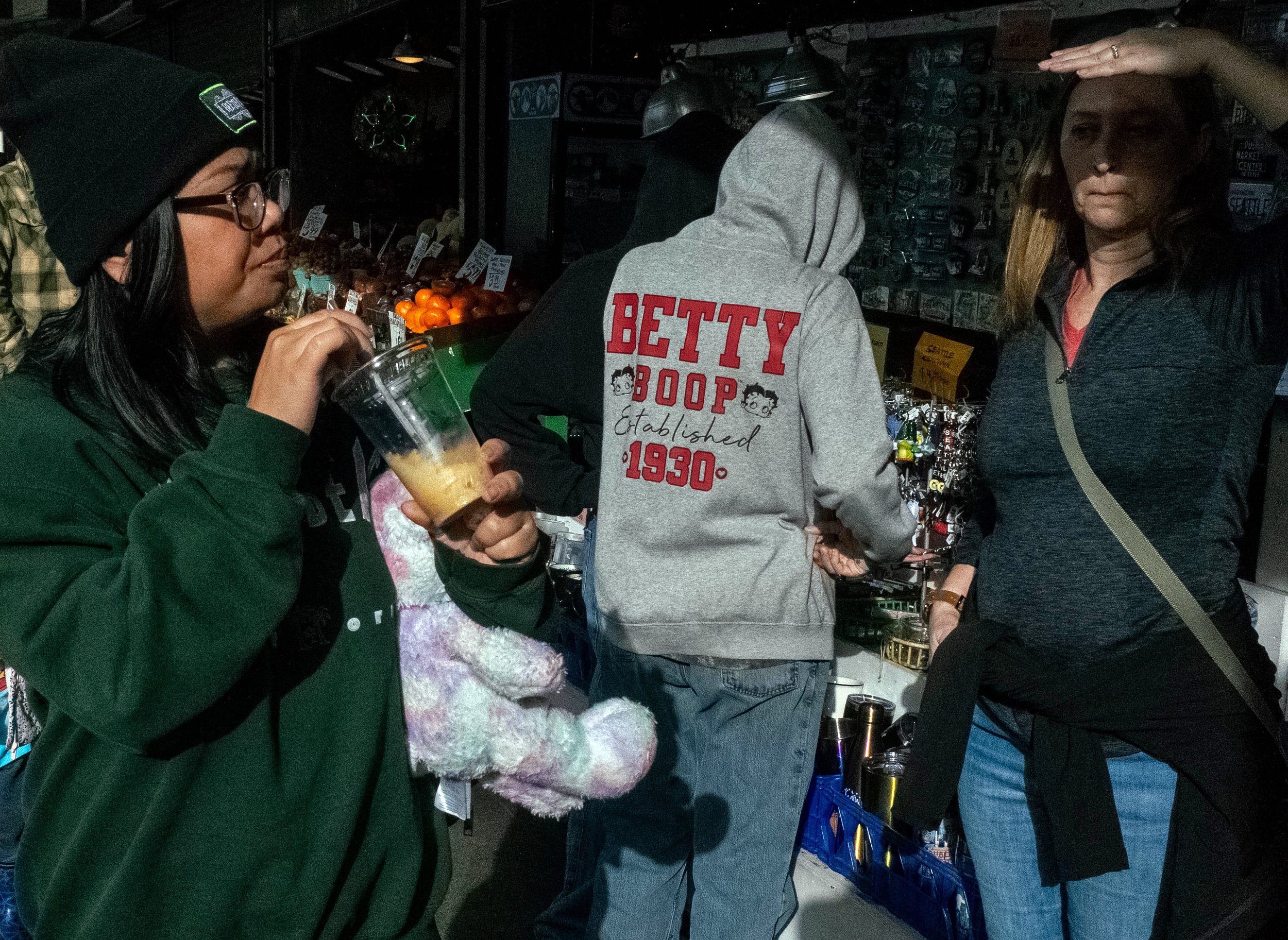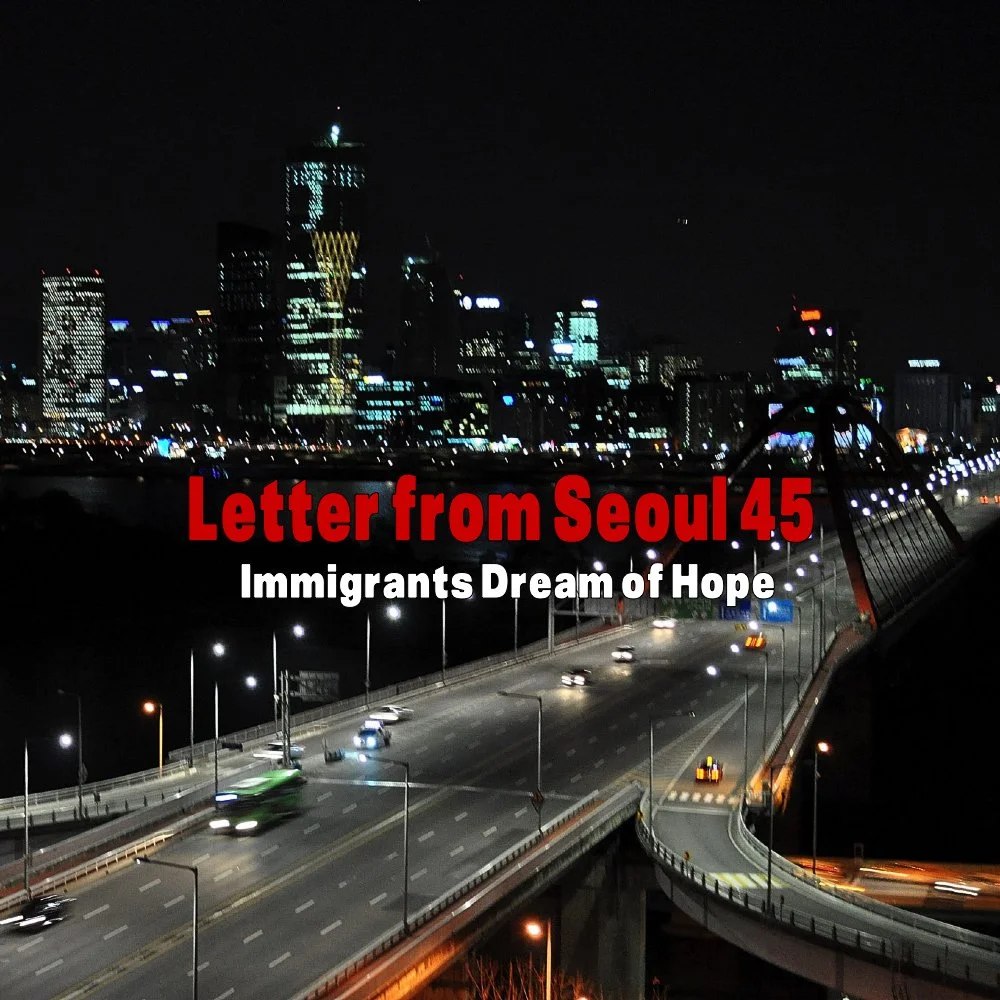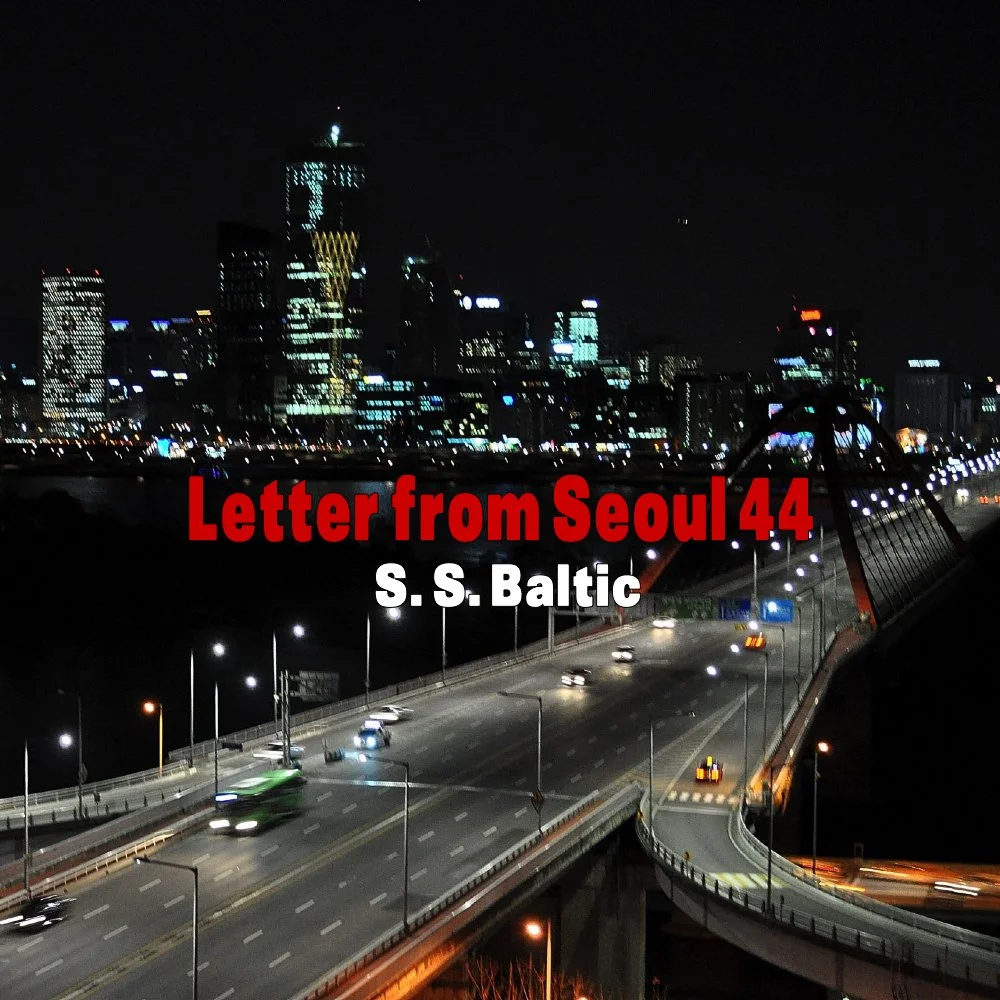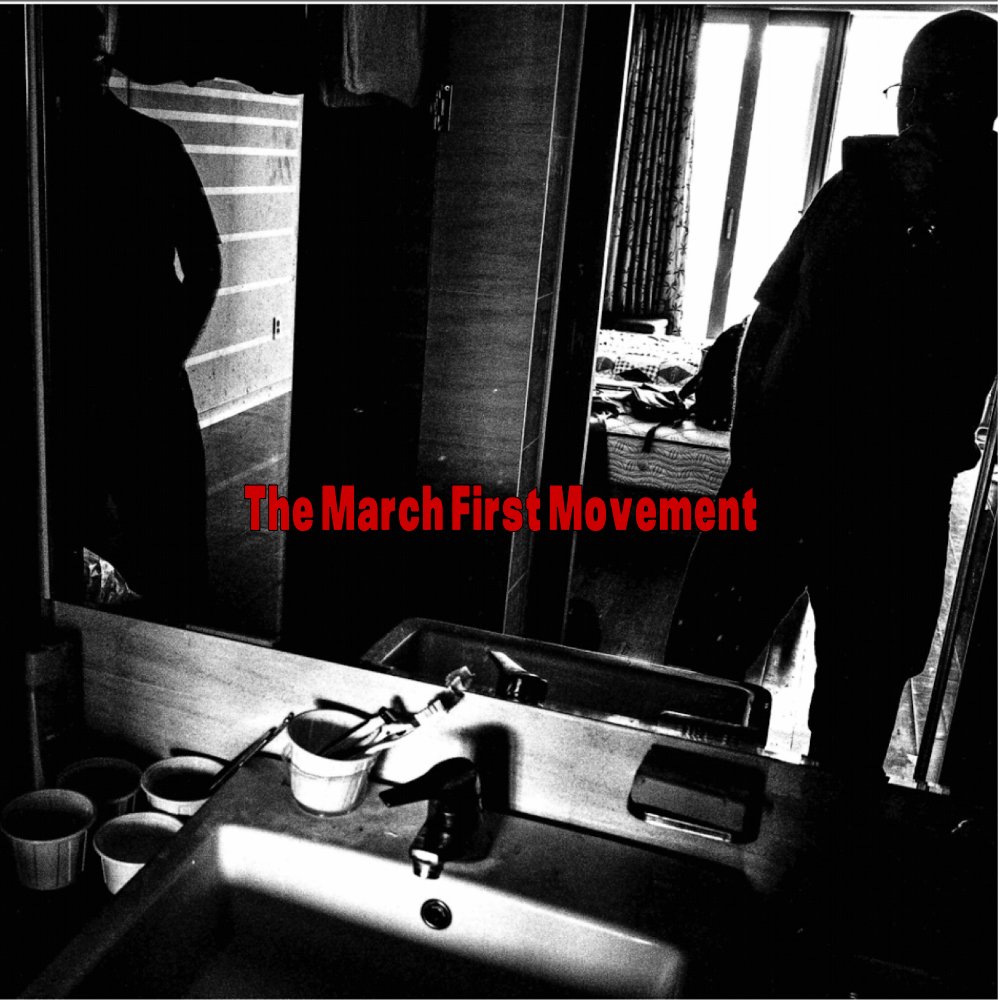Letter from Seoul - 14
Dispatch from Seattle
Flew into Seattle from Seoul on KE 041
Didn't get to sleep at all on the 10-hour flight.
On the way I wondered about politics in the U.S.A.
Man, it was a damn long night.
I’m back in America
I don’t recognize my country, anymore
Back in the United States of Amnesia.”
I have lived outside the United States for 22-years now, with an odyssey that includes residency in the Middle East, Western Europe and the Orient. For the last eight years, I have been a genuine expat. By this I mean no work visa tied to either an American government agency or an American business.
My wife is Korean and we enjoy retirement together in Seoul, with an apartment alongside the Han River and a view of the National Assembly on Yeouido (Yo-e-doe), the largest island in the river, which is 1,000 meters (3,280 feet) at its widest point.
If I can express myself in English half-way decently, I consider myself lucky. I’m a complete flop at foreign languages – except for basic salutations, some menu items and convenient obscenities.
My wife’s English is not bad, though she really speaks Konglish, an imaginative hybrid of Korean and English. Actually, her knowledge of French is much better than her English, since she taught the subject at the high school level for two decades. Yet “the heart wants what the heart wants” (a phrase first coined in a letter by Emily Dickenson), and somehow we have made a go of it for a dozen years now.
Our view about retirement is: “Have passport, will travel.”
When it’s time to visit the U.S. to see the sights, and acquire items difficult to find in Seoul, the shortest flight path to America is Seattle. There is no question that New York City is endlessly fascinating, but it’s a 14-hour one-way flight from Seoul. This was no problem a decade ago – but the Golden Years of retirement do not feel so golden after 14-hours in the Economy section of a plane.
As an American expat, I must still maintain state residency and pay all annual tax obligations, or face U.S. passport denial, plus IRS-related criminal charges. This applies to nearly 500,000 folks – mostly retirees, who live outside the U.S. to avoid the high cost of living expenses, especially medical debt; not to mention the utter madness of a country that will ban books but not guns.
In most countries around the world, men do not enter elementary schools and use students for target practice.
* * *
Known as the Emerald City, Seattle has a population of nearly 800,000 people – yet the metro area includes 4.2 million. The city, named for Chief Seattle (early 1780s-1866), a leader of the Duwamish and Suquamish peoples, is on Puget Sound in the Pacific Northwest, and surrounded by water, mountains and evergreen forests. It also rains here a lot.
Yet this is often considered a breath of fresh air compared to Seattle’s neighbors to the south that steal most of the West Coast attention – especially in Silicon Valley.
Seattle has a very high-tech profile with both Amazon and Microsoft headquartered in the metropolitan area. However, there are 35-other companies that round-out the city’s profile as a center for AI, IT, eCommerce, Hardware, Software, Robotics, Data Privacy, Cybersecurity, Healthtech, Digital Media. The list goes on, and on. Seattle can easily lay claim to being the Information Age Capitol of America.
Without question, Seattle is also the Coffee Capital of America – famous for roasting and supply chain management. Starbucks and Seattle’s Best (also owned by Starbucks) are the two most famous brands from the city, though there are a dozen more, including Peet’s Coffee.
How can one be productive in the high-tech world without some of the best coffee in the world?
Of course it’s impossible to ignore Seattle’s musical heritage. At the start of World War II, all major cities along the American west coast were involved in the boom to arm the American military effort in the Pacific, and Seattle was no exception. This helps explain why teenagers like Quincy Jones and Ray Charles came of age here when their families moved to the city to work in the factories and shipyards.
The Baby Boom era that followed accounts for Jimi Hendrix and Heart. In turn, this paved the way for Nirvana, Foo Fighters, Alice in Chains, Death Cab for Cutie, Pearl Jam, Soundgarden, and Sir-Mix-a-Lot.
* * *
Last year, we came to Seattle at the beginning of October. The weather was pleasant enough – knowing that any coastal city is prone to quickly changing weather conditions. What a difference a month makes. The weather has the usual sun-rain flip-flop, but the temperatures are usually around 12C during the day – and damp. No shorts for this visit.
The photo I submitted the other day from Pike’s Market – a well-established fish market near the ocean, known for the playfulness of staff members throwing large fish through the air to amuse the crowds – offered some dazzling sunlight for about 30-minutes, and then no mas ... non piu. I guess once I’m dead, if people throw me through the air for fleeting amusement it will not matter.
The other day, Sookyung popped into a store to “window shop.” That automatically means a 30-minute experience. So, I do what I usually do and reach for a camera. A great many of my street photography is the result of waiting outside a store for Sookyung.
As in all cases, I’m front and center, and if this is a problem go around me. The sidewalks are wide enough.
A hefty black man in a pseudo “official city” vest approached me.
“Why are you taking photographs?” he asked.
Not this again.
I did not bother to respond.
“Can I see what you’re taking photos of?” he asked.
“No,” I said.
“Well, it is in public. I guess you can do what you want. But you should ask people first.”
I did not bother to respond.
Yesterday (Sunday), Sookyung and I went for a stroll along the downtown waterfront. It’s nothing too impressive, yet designed for pedestrians, families, tourists. As we left the general area to head back to the hotel, a half dozen police were trying to subdue a man who had “gone off the chain” and tried to spit on them. As I reached the scene, he had just been handcuffed and face down on his stomach. The police made him wear a thin covering over his face to avoid any more spitting. The guy did not appear to be homeless – and was, in fact, well-educated with a wicked sense of humor. Unfortunately, the police were not his ideal audience.
Nonetheless, my photo-journalism instincts kicked in immediately and I got fairly close to the action. No one told me to fuck off.
All the photos are from the quite ordinary-looking Ricoh GR II, which is both light and easy to quickly adjust for fast-changing light conditions. Virtually all the photos are from 3rd Avenue in the downtown area, not far from our hotel on 5th Avenue—with the ocean just beyond 1st Avenue.
* * *
A card-carrying oligarch who has his major company headquartered in Seattle, and can easily waste $5.5 billion to go up in space in a phallic-shaped object for four-minutes could prove his masculinity in more mature fashion by helping to address the homeless problem in Seattle.
A Jeff Bezos donation of $5.5 billion to benefit the lives of an estimated 14,000-plus homeless people in Seattle would be money better spent than for an adolescent pissing contest over space ships with immigrant Elon Musk.
In my life, I have lived in several towns with that same population or less. Years ago, Montana’s Dawson County, near the North Dakota Badlands, only had 10,000 people. I simply can’t imagine an entire American town – or county so destitute as to live like feral dogs.
The U.S. government has no problem sending both billions in dollars and arms to help Ukraine resist Russian genocide, and to Israel to exterminate the Palestinians. Yet no funds for Americans in dire straits.
All of it is appalling and disgusting, A country cannot extol the virtues of any religion that encourages altruism, forgiveness, honor and tolerance – only to turn a blind eye in both individual practice and government policy. The hypocrisy cannot be defended.
The criteria for establishing homeless people in an urban area must accommodate variables that may change from place-to-place. However, the general consensus is that Seattle is in the Top-Five of American cities, along with New York City, Los Angeles and San Francisco in the mix.
In Seattle, most of the homeless – or “unsheltered,” as if the term is more palatable than the reality, are south of the Commercial and Financial Districts of the downtown area. Out of sight, out of mind.
It is here where the cast-offs and misfits, people who could not play the Squid Game; people who would not “get down in the boat and row” as wage-slaves; people who were dealt a bad card or two at the beginning of life and spend their days shouting at an imaginary deity in the sky.
Regardless of which fast-food holy franchise a homeless person might pray to in Seattle for fleeting solace, is an angel waiting to take the request?
“Do you want a delicious Zeus gyro with extra sauce?
How about Yahweh’s pastrami on a Kaiser roll?
Perhaps some of Jupiter’s homemade toasted ravioli?
Maybe God’s fully loaded cheeseburger with crispy fries?
Why not try some of Allah’s goat head soup with extra spicy seasoning?”
Yet no prayers by the homeless are being answered in Seattle.
* * *
While oligarch Jeff Bezos squanders another $5.5 billion to ride a phallic object into space for four minutes, he ordered his Washington Post editorial staff to kill an important Presidential endorsement for Kamala Harris – and then immediately met with Trump advisors about “space contracts.”
Some people can surgically remove their own spines. Bezos is the Poster Boy for this year.
As an American expat, it is my right to vote with an absentee ballot.






















































